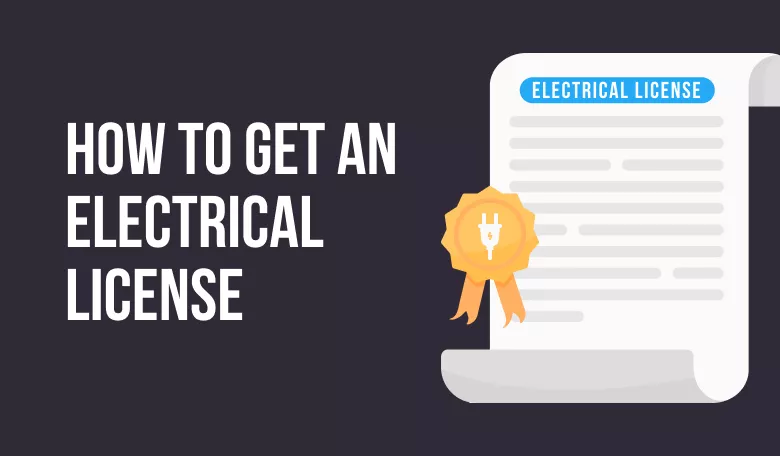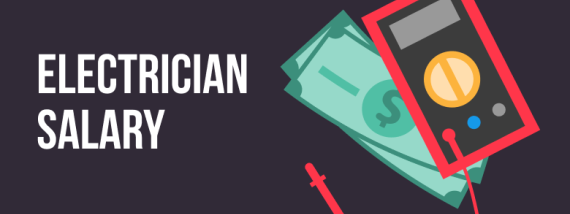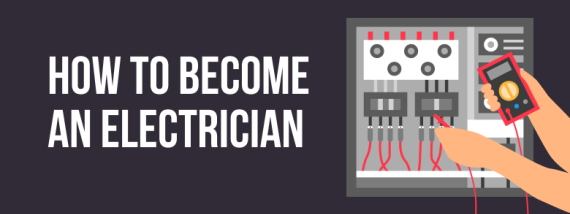How to Get an Electrical License

Gaining an electrical license will allow you to work as a professional electrician and build a career in the electrical trade. Rules and requirements vary by state but in general, you’ll need to prove you have a certain level of knowledge and experience before your electrician license will be granted. Take a look at our step-by-step guide to find out more.
Electrical License Requirements by State
Each state sets its own rules, so it’s essential to check the licensing requirements in your area before you begin your license application.
Alabama
Electrical licenses in Alabama are issued by the Alabama Electrical Contractors Board. To get a journeyman electrician license, you’ll need 8,000 hours of experience.
Alaska
You’ll need to apply to the Alaska Department of Labor and Workplace Development for your journeyman or electrical contracting license.
Arizona
The Arizona Registrar of Contractors awards three types of electrical license to residential and commercial contractors working in the state.
Arkansas
The Arkansas Department of Labor issues a choice of licenses to professional electricians.
California
Electricians working on projects worth $500 or more are required to get a license from the California Department of Consumer Affairs, Contractors State License Board.
Colorado
To become a licensed master electrician in Colorado, you’ll need to show you have at least 2,000 hours of experience in planning, layout, and supervising installation within the last year.
Connecticut
The Connecticut Department of Consumer Protection issues both journeyman and contractor licenses to electricians working in the state.
Delaware
The Delaware Division of Professional Regulation issues a range of electrician licenses including master, master special, limited and limited special.
Florida
Electricians in Florida are required to pass a two-part exam and show that at least 40% of their experience is with 3-phase services.
Georgia
Before you can get your trade license in Georgia, you’ll need to show proof of four years of experience working under a licensed contractor and pass a professional exam.
Hawaii
The Department of Commerce and Consumer Affairs, Professional and Vocational Licensing, Board of Electricians and Plumbers offers a wide range of trade licenses, each with its own requirements.
Idaho
Electrician licenses in Idaho range from apprentice to specialty electrical contractor and are awarded by the Idaho Division of Building Safety.
Iowa
Iowa has multiple types of licenses, each with its own electrician licensing requirements.
Kentucky
As well as a trade license, electricians in Kentucky are required to have business insurance. These policies should include general liability insurance.
Louisiana
You’ll need to apply for a commercial contractor license if you wish to take on work worth more than $10,000.
Maine
You can apply for a range of licenses in Maine. All require proof of experience and an exam.
Maryland
Maryland only issues master electrician licenses. You’ll need to prove you have 7 years of experience to qualify.
Massachusetts
Electricians in Massachusetts, need to secure a license from the Board of State Examiners of Electricians.
Michigan
To become a journeyman electrician in Michigan, you must be 20 or older and have at least 8,000 hours of experience.
Minnesota
Electricians in Minnesota need at least 48 months experience before they can secure a license.
Mississippi
You must hold a professional license in Mississippi to work on jobs worth more than $10,000.
Montana
The Montana Department of Labor and Industry, State Electrical Board awards licenses in the state.
Nebraska
Apprentice electricians need to be registered with the state and journeymen need four years of experience.
Nevada
Electricians must hold a C-2 classification license in order to work in the state.
New Hampshire
You’ll need 8,000 hours of experience before you can apply for a journeyman license in New Hampshire.
New Jersey
Only electricians over the age of 21 can apply for a license in New Jersey.
New Mexico
New Mexico awards a wide range of specialist licenses to electricians working in the state.
North Carolina
The State Board of Examiners of Electrical Contractors issues 10 different types of electrical contracting license.
North Dakota
North Dakota has three main types of electrical license: Journeyman, Class B and Master Electrician.
Ohio
You must show proof of liability insurance before you can secure an electrician’s license in Ohio.
Oklahoma
The Oklahoma Construction Industries Board issues a wide range of electrical licenses.
Oregon
Licenses in Oregon are awarded by the Department of Consumer and Business Services, Building Codes Division.
Rhode Island
In Rhode Island, you can apply for a license as an electrical journeyperson or an electrical contractor.
South Carolina
South Carolina licenses are awarded by the South Carolina Department of Labor, Licensing, and Regulation, Residential Builders Commission.
South Dakota
To do any electrical work in the state, you need to get a license from the South Dakota Department of Labor and Regulation, Electrical Commission.
Tennessee
Electrical licenses in Tennessee are awarded both at the state and local level.
Texas
No exam or experience is required to become an apprentice electrician in Texas, though you’ll need 8,000 hours of on-the-job training to become a journeyman.
Utah
Electricians must be licensed by the Utah Department of Commerce, Division of Occupational and Professional Licensing.
Vermont
Journeymen in Vermont must have 12,000 hours of experience to secure a license.
Virginia
Exams are required for all electrical licenses issued in Virginia.
Washington
You must hold a license from the Washington State Department of Labor and Industries to work as an electrician in the state.
West Virginia
The West Virginia Fire Commission awards electrical licenses in the state.
Wisconsin
All electricians working in the state need to get a license from the Department of Safety and Professional Services.
Wyoming
The Wyoming Department of Fire Prevention and Electrical Safety awards electrical licenses in the state.
Illinois, Indiana, Kansas, Missouri, New York, Pennsylvania
These states don’t have state licensing laws. Instead, the licensure process is managed at a municipal level.
Types of Electrical Licenses
There are three main types of electrical licenses:
- Apprentice
- Journeyman
- Master electrician
As you might expect, an apprentice is the lowest level of qualification. If you’re an apprentice electrician, it shows that you’re enrolled in an apprenticeship program and are learning the basics of electrical work. In most states, you need to prove that you’ve completed a recognized apprentice training program before you can become a journeyman electrician.
A journeyman, or journeyperson, electrician is a trained and experienced electrician who can work on his or her own under the general guidance of a master electrician. Once you’ve worked as a journeyman for a certain number of years, you’ll be able to apply for your master electrician license.
- Master electrician is the highest level of qualification. It shows you have extensive expertise in electrical theory and can take on a wide range of jobs in both commercial and residential builds. If you become a master electrician, you’ll be able to do the most complex electrical wiring jobs and be able to train journeymen.
Full Process to Getting an Electrical License
If you’ve decided that a career in electrical installations is for you, you’ll need to ensure you tick all the necessary boxes to secure your license. Here’s the full process required to get qualified.
Attend a Vocational or a Trade School
Attending a vocational or trade school will give you the chance to learn the basics and start your professional job training. You’ll generally need a high school diploma before you can apply for local vocational schools, so if you’re yet to get your GED, now’s the time to get back in the classroom.
Become an Electrician’s Helper
The next step in your electrician training is to become an electrician’s helper. Working on real building sites will give you the chance to get a feel for what the job entails and make sure the career is right for you.
Apply for an Electrician Apprenticeship Program
An apprenticeship program is a structured program designed to take beginner electricians and turn them into professionals. Typically, apprenticeship programs involve hundreds of hours of classroom training as well as practical work experience under a licensed electrician.
Most apprenticeships take around two to five years to complete. At the end of your course, you should have a thorough understanding of different electrical systems and be perfectly placed to start the next stage of your training.
Ask your local community college if they offer classroom instruction and if they can put you in touch with a professional looking for an electrician apprentice. Organizations that sponsor or provide apprenticeship programs in the US include:
- International Brotherhood of Electrical Workers
- National Electrical Contractors Association
- Independent Electrical Contractors Association
- Associated Builders and Contractors
Take Your State Licensing Exam
Once you’ve completed your apprenticeship, you’ll need to take your state license exam. The exact content of the exam will vary state by state, but you'll probably need to demonstrate a good knowledge of the National Electrical Code in order to pass. The National Electrical Code lays out laws, regulations and other information about safe practices and is essential reading for anyone entering the industry.
How Much Does it Cost to Get an Electrical License?
The cost of getting an electrical license will vary depending on your training course and your state licensing laws. If you attend a vocational school, you could be looking at around $15,000 in fees. Most states also charge an application fee for sitting the electrical contractor license test.
You’ll also need to factor in the cost of posting an electrical contractor bond. Most states and licensing bodies require electricians to post a bond before receiving their license. The amount you’ll pay for your bond will depend on your state and the type of license you’re applying for.
Contact your local vocational school and state licensing board to find out more. Alternatively, get in touch with the International Brotherhood of Electrical Workers to see if they can offer you guidance on the most affordable training options.
How Long Does It Take to Get an Electrical License?
In most cases, it will take two to five years of classroom instruction and hands-on training to get your electrical license. Again, exact requirements vary by state, so you’ll need to talk to your local municipality to find out more.
Where Can I Find More Information Specific to my State?
You can find the website of your state’s regulatory authority on the table below
- Fast and Secure Application
- Nationwide Coverage
- Approval in Minutes
- Money Back Guarantee
Recommended Articles
- Fast and Secure Application
- Nationwide Coverage
- Approval in Minutes
- Money Back Guarantee
- Image

- Image

- Image

Lance Surety Bond Associates, Inc. is a surety bond agency based out of southeastern Pennsylvania that is able to write all surety bond types in all 50 states. We are dedicated to servicing all of our customers' surety bonding needs throughout the country and guarantee competitive rates, timely responses, and unparalleled customer service.







